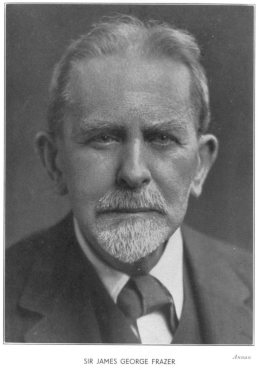from our friend Gerald’s blog : http://reykr.livejournal.com/
When I was a boy, in the 1940s, I sometimes read the Sears-Roebuck catalogs, for fun and information. Among the books that were shown for sale in those catalogs was an abridgement, I think in one-volume, of Frazer’s classic work “The Golden Bough.” I don’t think that book was available in the Carnegie Public Library in Cresco, my home town. When I grew up and got to other places, with bigger libraries, I finally read it.
The following is from Wikipedia, the free encyclopedia:
Sir James George Frazer (January 1, 1854, Glasgow, Scotland – May 7, 1941), was a Scottish social anthropologist influential in the early stages of the modern studies of mythology and comparative religion.
He studied at the University of Glasgow and Trinity College, Cambridge, where he graduated with honors in Classics (his dissertation would be published years later as The Growth of Plato’s Ideal Theory) and remained a Classics Fellow all his life. He went on from Trinity to study law at the Middle Temple and yet never practised. He was four times elected to Trinity’s Title Alpha Fellowship, and was associated with the college for most of his life, except for a year, 1907-1908, spent at the University of Liverpool. He was knighted in 1914. He was, if not blind, then severely visually impaired from 1930 on. He and his wife, Lily, died within a few hours of each other. They are buried at the Ascension Parish Burial Ground in Cambridge, England.
The study of myth and religion became his areas of expertise. Except for Italy and Greece, Frazer was not widely traveled. His prime sources of data were ancient histories and questionnaires mailed to missionaries and Imperial officials all over the globe. Frazer’s interest in social anthropology was aroused by reading E. B. Tylor’s Primitive Culture (1871) and encouraged by his friend, the biblical scholar William Robertson Smith, who was linking the Old Testament with early Hebrew folklore.
Frazer was far from being the first to study religions dispassionately, as a cultural phenomenon rather than from within theology. He was though the first to detail the relations between myths and rituals. His theories of totemism were superseded by Claude Lévi-Strauss and his vision of the annual sacrifice of the Year King has not been borne out by field studies. His generation’s choice of Darwinian evolution as a social paradigm, interpreted by Frazer as three rising stages of human progress — magic giving rise to religion, then culminating in science — has not proved valid. Yet The Golden Bough, his study of ancient cults, rites, and myths, including their parallels with early Christianity, arguably his greatest work, is still rifled by modern mythographers for its detailed information. Notably, The Golden Bough influenced René Girard; and led him to study anthropology to develop his mimesis theory of the scapegoat. The work’s influence spilled well over the conventional bounds of academia, however; the symbolic cycle of life, death and rebirth which Frazer divined behind myths of all pedigrees captivated a whole generation of artists and poets. Perhaps the most notable product of this fascination is T. S. Eliot’s The Waste Land.
The first edition, in two volumes, was published in 1890. The third edition was finished in 1915 and ran to twelve volumes, with a supplemental thirteenth volume added in 1936. He also published a single volume abridgement, largely compiled by his wife Lady Frazer, in 1922, with some controversial material removed from the text.
thanks, gerald!
=
c
